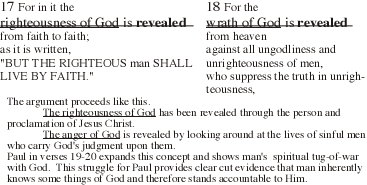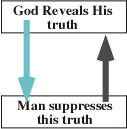
Page #1
THE EVIDENT GUILT OF MANKIND


The long standing argument has been that since man has difficulty understanding truth, then he is
not responsible for his sin. In this case, man pleads "ignorance then innocent" of knowing an
invisible God and His standards. Most typically, they will refer to some remote tribe in an
obscure part of the world. But usually they are referring to their own excuse, "What I don't know,
won't hurt me." Man in every case will seek a comfortable place to hide from his sin and rebel
against God. God, however, repeatedly states man is responsible for his sinful behavior. Paul
states this here by revealing how it is that man knows about God.
not responsible for his sin. In this case, man pleads "ignorance then innocent" of knowing an
invisible God and His standards. Most typically, they will refer to some remote tribe in an
obscure part of the world. But usually they are referring to their own excuse, "What I don't know,
won't hurt me." Man in every case will seek a comfortable place to hide from his sin and rebel
against God. God, however, repeatedly states man is responsible for his sinful behavior. Paul
states this here by revealing how it is that man knows about God.
A. The Confirmation of Knowing God (Ro 1:18-20)
1. The Wrath of God Revealed (18-19)
2. The Invisible Attributes of God Revealed (20)
Although Calvin believes Paul is
starting a new topic in verse 18, it
seems fairly clear through the par-
allel language that Paul is continu-
ing his discussion on the revelation
of God and the accountability of
mankind.
starting a new topic in verse 18, it
seems fairly clear through the par-
allel language that Paul is continu-
ing his discussion on the revelation
of God and the accountability of
mankind.




The tension of their unwilling-
ness to live by the truth is obvi-
ous because of the judgment
(anger) of God upon their lives.
ness to live by the truth is obvi-
ous because of the judgment
(anger) of God upon their lives.
"God made it evident
to them"
to them"
"... have been clearly seen, being
understood through what has been
made, so that they are without excuse."
understood through what has been
made, so that they are without excuse."
"... so that they are
without excuse."
without excuse."
Biblical Foundations for Freedom
His central argument